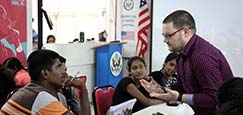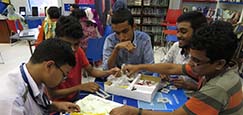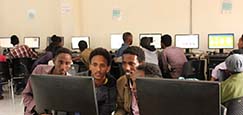Download the American Spaces Handbook here.
- Programming
- Thematic Resources
- Programming Packages
- Planning Your Event/ Program
- Regional Resources
- Managing Your Space
- American Spaces Handbook
- Design Your Space
- American Spaces Standards

Guidelines for the services and programs an American Space should offer, the resources that should be available, and how the American Space should look and feel to a visitor.
- A Modern American Space

A modern American Space is a physical venue for public engagement with foreign target audiences in support of United States foreign policy objectives.
- Training
- In Person Training

The Office of American Spaces offers basic and advanced training courses for those who staff and manage American Spaces.
- Virtual Training

The Office of American Spaces training team is developing self-paced training modules based on the annual central training program for managers and employees of American Spaces around the world.
- About Us
